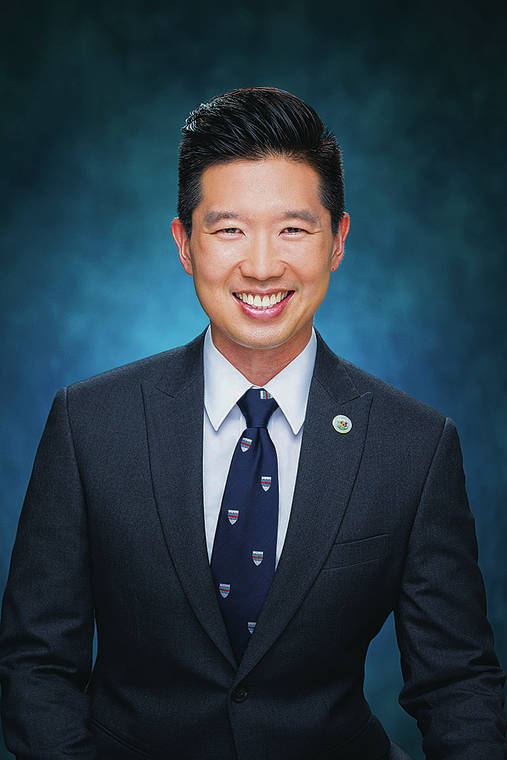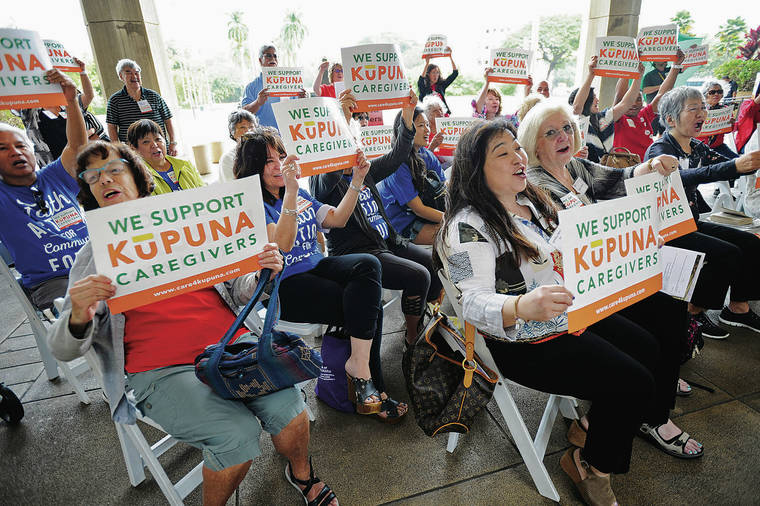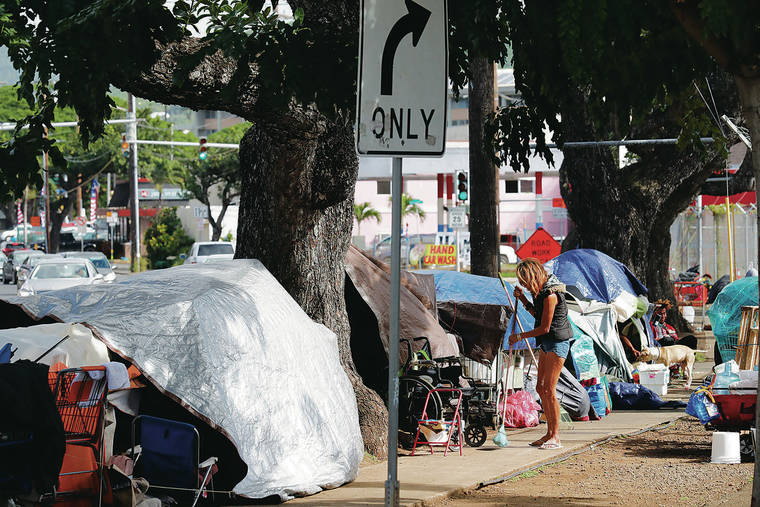‘Big ideas’ finished at Legislature, critics say

COURTESY OF THE HAWAII STATE SENATE
“Hawaii went from being one of the most progressive states in the country — whether it’s the Prepaid Health Care Act, the first state to legalize abortion, the first state to pass the Equal Rights Amendment — to really not being a very progressive state.”
Stanley Chang
State senator (D, Diamond Head-Kahala-Hawaii Kai)

BRUCE ASATO / 2019
Hawaii was the first state in the nation to adopt legislation like Kupuna Care. Seniors, their caregivers and advocates held a rally at the Capitol in March.

JAMM AQUINO / JAQUINO@STARAVERTISER.COM
Homelessness and housing are some of the issues commonly addressed in the Legislature each year.



When Hawaii Democrats are feeling nostalgic for the good old days, they sometimes talk about passage of the Prepaid Health Care Act, a law that may be the defining achievement of the generation of politicians who ran the party and state government in the 1960s and 1970s.
That act required that Hawaii employers offer health coverage to their full-time workers, and was the first state law of its kind in the nation. It was bold and controversial, and was quickly challenged in federal court, but it eventually reshaped delivery of health care in this state.
More than 45 years after it was signed into law, some lawmakers doubt the act would pass if it was introduced at the state Legislature today.
That skepticism may be a measure of how much politics at the state Capitol has changed over the decades. While previous generations of Democrats were determined to pursue dramatic goals such as employer- funded health care Opens in a new tab or a temporary disability insurance system, a more cautious cadre of lawmakers seems to be aiming lower today, according to the critics.
When the state Legislature reconvenes Wednesday, it will again be confronted with the daunting problems of homelessness, a lack of affordable housing and the ever-upward cost-of-living spiral that is often blamed for three straight years of declining population in the islands.
But few people seem to expect Gov. David Ige or the Legislature will launch a slate of bold new initiatives to resolve those pressing issues anytime soon. Hawaii politics apparently doesn’t work like that anymore.
Don't miss out on what's happening!
Stay in touch with breaking news, as it happens, conveniently in your email inbox. It's FREE!
“It’s ironic that we used to have so many big ideas in this state, and now we don’t. It’s sad,” said state Sen. Stanley Chang, who has been pushing ambitious plans of his own to cope with the state housing shortage.
“Hawaii went from being one of the most progressive states in the country — whether it’s the Prepaid Health Care Act, the first state to legalize abortion, the first state to pass the Equal Rights Amendment — to really not being a very progressive state,” said Chang (D, Diamond Head-Kahala-Hawaii Kai).
Chang and others cited the effort to increase the state minimum wage of $10.10 an hour. Increasing the wage floor is seen as a way to help struggling workers at the bottom of Hawaii’s economic pecking order, but proposals to increase the minimum to $15 an hour failed last year Opens in a new tab. This year advocates for a higher minimum wage are aiming for $17 an hour Opens in a new tab.
The current minimum of $10.10 took effect two years ago, and business lobbyists say Hawaii small businesses cannot afford a new, large increase. They say that is partly because of other costly state mandates such as the Prepaid Health Care Act and temporary disability insurance, and also warn that a higher minimum wage will cause companies to eliminate jobs.
Another proposal kicking around the Capitol is paid family leave. Lawmakers ordered up a study Opens in a new tab in 2018 of ways to fund and implement paid family leave in Hawaii, but it is unclear whether that idea will move forward this year.
Colin Moore, director of the Public Policy Center at the University of Hawaii at Manoa, said the Legislature has become “an extremely cautious body in a way it wasn’t in the ’60s and ’70s.” Moore said he doubts paid family leave will pass this session.
“It’s actually not radical at all; there are many states that have it. It’s actually less radical than prepaid health care would have been in the ’70s,” he said. “Here you have a policy that’s well accepted; it’s not as if Hawaii is the first one to have it this time. California has had it for I don’t know how long, so why the fear?”
“I’m kind of curious what the reason for not passing it this year will be, but I don’t expect it to pass,” Moore said.
Moore and others recalled famous early Democratic leaders such as state Rep. Yoshito Takamine, who advanced collective bargaining legislation in the 1960s, and Sen. Nadao Yoshinaga, who is generally credited with shepherding the Prepaid Health Care Act through the Legislature in 1974.
“I don’t see that courage anymore,” Moore said. “I guess I’m thinking, Who is the current Yoshito Takamine? And I can’t think of one. Who would be able to move something like that?”
Chang believes the generation of Democrats who seized control in 1954 Opens in a new tab, which included many World War II veterans, “knew what it was like to be discriminated against, to be segregated, to have to go to these concentration camps.”
Many of those leaders have retired or died, “and it’s really too bad that we don’t have that same sense of urgency to rectify these wrongs and to blaze new ground,” he said.
Chang has been advocating for an ambitious program to develop large numbers of high-rise leasehold condominiums on state lands to solve the affordable-housing shortage, but so far, his proposal has made little progress. He said one of the main obstacles to fixing the problem is a sense of hopelessness among voters, a feeling that nothing can be done.
“People in Hawaii just don’t even believe that we can end the housing shortage. It’s been with us for so long, it’s like God-given,” he said. “But of course, we can. Singapore has done it, Vienna has done it, other jurisdictions have done it.”
That is not to say that Ige and lawmakers plan to do nothing this year. Ige has proposed a package of special pay raises for teachers who take jobs in hard-to-fill slots such as special education, and is also seeking a large increase in state construction spending. He requested $2.6 billion in appropriations for next year for the public works initiative, which would be an extraordinary increase in construction funding.
House and Senate leaders, meanwhile, are expected Tuesday to announce their plans for this year, including as-yet undisclosed education and housing initiatives. Those initiatives will be helped along by a cheery new estimate that the state will collect about $75 million more in taxes next year than was initially expected.
And lawmakers have taken steps in recent years to cope with social problems, such as approving the Kupuna Care program to support Hawaii’s large and growing senior population.
That initiative pays for community and in-home services for seniors or disabled people to allow them to continue to live at home, rather than be forced to move into care homes. Those services are also designed to help family caregivers remain in the workforce, instead of being forced to quit their jobs to care for senior or disabled kin.
The AARP says Hawaii is the first state in the nation to adopt a measure like the Kupuna Care program, but funding has been so limited that it reaches only a small fraction of the families who qualify. The program is budgeted for $1.5 million this fiscal year, but no funding has been allocated yet for next year.
The future of Kupuna Care is still uncertain, in part because some lawmakers say privately they are worried it could expand into an expensive new publicly funded entitlement program. It might then divert resources away from the many other challenges the state faces, such as homelessness, housing, educational needs and coping with climate change.
Senate Democratic Majority Leader J. Kalani English suggested that people who compare the Democrats’ accomplishments of decades ago with what is happening at the Capitol today may be overlooking how much the lawmaking process has changed.
Today people want an open process and an opportunity to provide input on decisions in ways that were not common practice in the 1960s, he said. “They didn’t have public hearings. They didn’t have all that stuff. They said, ‘Here’s what we’re doing,’” English said. Now, “people want process and they want openness, and part of that is a different way of coming to decisions.”
The state was emerging from the “complete servitude” of the plantation-era oligarchy, and the memory of martial law during WWII was still fresh. Voter participation was much higher than today, and “there was a lot more trust in their elected leaders,” said English (D, Molokai-Lanai-East Maui).
“There were some heroic choices in the early days of statehood, but that was the context of it,” he said. “We have a mature, modern, thriving democracy, and it’s no longer laying the cornerstones, like they did. It’s maintaining and encouraging and growing it.”
Turning to specific issues such as minimum wage, English said the Senate has supported that idea but is also trying to develop a package that might include steps such as reducing income taxes on low-income residents to provide relief from the high cost of living.
For the public, “it’s their right to say this is what we want, but it’s our responsibility to think through all the implications of it and to come up with a package that can work for a vast majority of the people,” he said.
On the House side, Speaker Scott Saiki said there is less of a public consensus today about exactly what lawmakers should do. There are fewer active union members making demands today than decades ago, and people are busy working, fighting traffic and raising children, he said. “People are busy, and for different reasons they can’t be involved,” he said.
“We just don’t have a groundswell of support for universal mandates like in 1974,” said Saiki (D, Downtown-Kakaako-McCully). If there were such a groundswell today, lawmakers would listen, he said.





